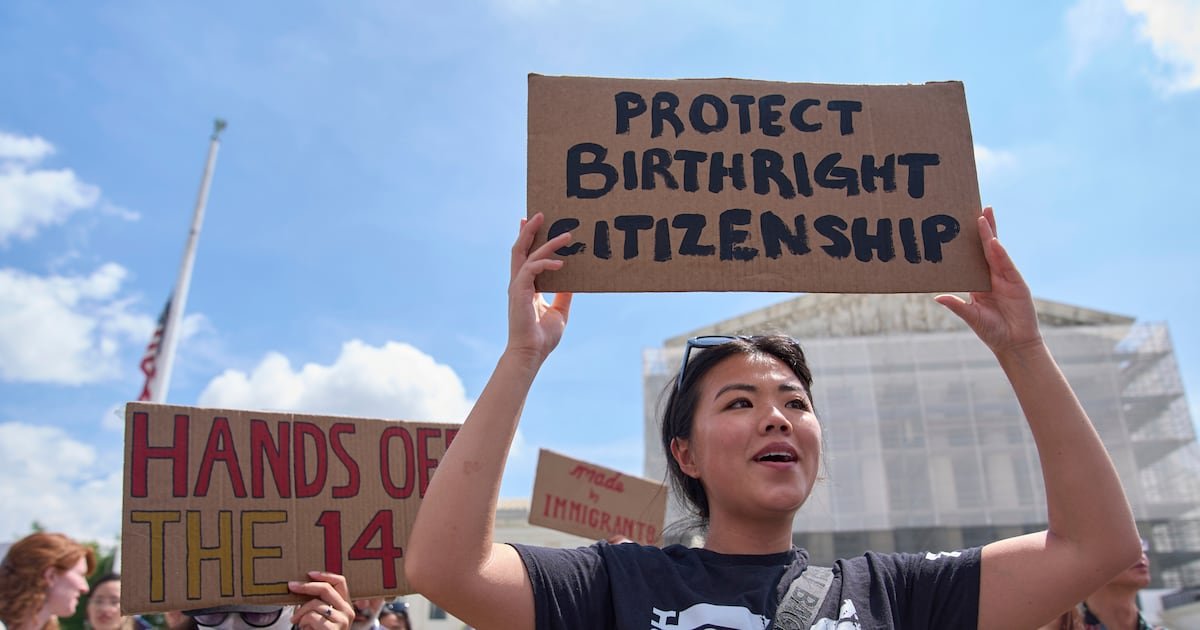A federal judge on Thursday again banned President Donald Trump from enforcing his executive order to end birthright citizenship just days after the Supreme Court weighed in on the use of nationwide injunctions placed by federal judges.
The class action lawsuit is the first major legal test of Trump’s order since the justices determined lower court judges could not place universal injunctions on federal policies. The class action will include all children who would be affected by the order, but does not include their parents, as the plaintiffs originally wanted.
The federal judge in New Hampshire, Judge Joseph Laplante, banned Trump from implementing the order after advocates asked him to grant the class action.
Laplante agreed, allowing the plaintiffs to continue and a new judicial order to be put in place. He said he would stay his ruling for several days to allow the Trump administration to file an appeal, Reuters reported.
The suit was filed by the American Civil Liberties Union and other advocate groups just hours after the Supreme Court ruled on the matter.
Case overview
The president signed an executive order shortly after taking office that sought to reinterpret the Constitution’s language allowing citizenship to nearly every child born in the United States, regardless of their parents’ status. Trump’s order would effectively end birthright citizenship in the country and was challenged in multiple federal courts before being brought to the Supreme Court.
Last week, the justices issued a ruling on the Trump v. CASA case, but did not ultimately touch the issue of birthright citizenship, instead addressing the issue of nationwide injunctions, prompting questions about the future of citizenship in the U.S. and the legal battle ahead.
Trump’s order became the subject of three lawsuits later consolidated into one for the Supreme Court to review. In each of the cases, a lower court judge issued a nationwide injunction to prevent Trump’s order from going into effect. The judges argued that the president and his team would be unlikely to successfully defend that the order was constitutional.
The Trump administration in March asked the Supreme Court to examine the issue of nationwide injunctions. They were asked to weigh in on whether lower court judges exceeded their power by issuing nationwide pauses on Trump’s order.
The Supreme Court declined to touch the birthright issue, and ultimately ruled the judges could not place universal injunctions on federal policies.
The ruling is being viewed as a win for the Trump administration since the birthright issue was punted to a later date and Trump’s order was set to go into effect on July 27.
That’s when the ACLU and other groups stepped in to file a class action lawsuit.
What will happen next
After the Supreme Court’s ruling last week, experts argued that the next course of action for advocates would be a class action lawsuit. The judge’s ruling Thursday allowed it to proceed.
Ilya Shapiro, a senior fellow at the Manhattan Institute, said he believes the case will come back before the Supreme Court, likely in the upcoming fall term.
“These things seem to be moving very quickly,” he said in an interview.
Similarly, Attorney General Pam Bondi expressed confidence that birthright citizenship would reach the Supreme Court in its fall term and the administration would follow the law on a “case by case” basis.
“We’re very confident in the Supreme Court, but again, it’s pending litigation and that will directly be determined in October,” Bondi said in a press conference after the Supreme Court’s ruling.
Stephen Vladeck, a Supreme Court expert and Georgetown University law professor, predicted that a judge, like Laplante did Thursday, would issue a preliminary injunction and recognize the plaintiffs’ class action to freeze the order from going into effect.
He said he has confidence that the district courts would do that, but was concerned that the Supreme Court would “take exception to how the class is certified” once the Department of Justice challenges the class action suit.
Bondi responded to the class action in a post online Thursday, saying a “rogue district court judge is already trying to circumvent” the Supreme Court’s ruling.
“The American people see right through this. Our attorneys @thejusticedept will fight this unconstitutional power grab as @POTUS continues to secure our border,” she wrote, confirming the legal battle will continue.
Vladeck noted that the Trump administration can appeal the suit to the Supreme Court, and challenge Laplante’s determination to consolidate the plaintiffs into class certification determination. He noted that this is where the Supreme Court’s shadow docket comes into play.
The shadow docket is when the Supreme Court issues emergency orders outside of its regular cases. It allows the justices to address something urgently, but has often been criticized because their decisions do not usually provide context or reasoning from the justices. Critics and Democrats say the court has tended to favor the Trump administration when it comes to emergency cases.
Chief Justice John Roberts noted during oral arguments that cases can move swiftly through the court, like it did with the TikTok ban case earlier this year.
Vladeck said he was going to be “a little wary of how viable” the class action alternative to birthright will be until the Supreme Court gives the green light to the class certification outlined in Laplante’s ruling.
“This is where it’s all really going to come down to some combination of Chief Justice John Roberts and Justices Brett Kavanaugh and Amy Coney Barrett,” he said.


